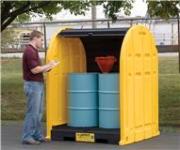Billions of dollars lost each year as waste heat from industrial processes can be converted into electricity with a technology being developed at the Department of Energy's Oak Ridge National Laboratory.
More than 400 scientists, lawmakers and the nation's top conservation leaders asked the Obama administration to set clear standards for water and wildlife protection in sweeping new rules that would apply to 193 million acres of national forest lands.
EPA announced improvements to the availability and usability of drinking water data in the Enforcement and Compliance History Online tool.
Cigarette smoking, forest fires and woodburning can release a chemical that may be at least partly responsible for human health problems related to smoke exposure, according to a new study by NOAA researchers and their colleagues.
The agreement resolves the company’s National Pollution Discharge Elimination System permit violations and unpermitted discharges at the mines and mills that occurred from 2008 to 2010.
Barred owls may be more abundant in coniferous forests of the Pacific Northwest than previously recognized, according to research published in the Journal of Wildlife Management.
Solar-powered boats built and raced by students from California high schools captured the top awards at the ninth annual Solar Cup competition sponsored by the Metropolitan Water District of Southern California and local water agencies.
Earlier this year, Boston University researchers and collaborators conducted a mobile greenhouse gas audit in Boston and found hundreds of natural gas leaks under the streets and sidewalks of greater Boston.
Researchers examining the San Andreas Fault in central California have found evidence that distant earthquakes can trigger episodes of accelerated, but still quite slow, slip motion, deep on the fault.
Region 7’s latest round of CAFO enforcement activity, aimed at encouraging producers’ compliance with the Clean Water Act and the National Pollutant Discharge Elimination System (NPDES) permitting program, involves seven beef feedlots, including four in Iowa, two in Kansas and one in Nebraska.
Autocar announced the launch of its E3 advanced series hybrid cab/chassis, the culmination of a rigorous testing and validation program that follows the successful implementation of a pre-production E3 fleet in service in the greater Miami area.
CWCO selected the devices and pumps based on its experience with them in two previous SWRO projects.

Ignoring EPA regulations can be costly -- and not just in terms of fines.
Clean water is a rare commodity in many countries of the world and governments often face problems ensuring its reliable supply. In Mongolia, an interdisciplinary research team is demonstrating how this vital resource can be efficiently managed and used. Specially developed software help to detect weak points in the supply system.
The U.S. Department of Energy's National Renewable Energy Laboratory (NREL) released its annual assessment of leading utility green power programs.
The American Physical Society has released a new assessment, titled “Direct Air Capture of CO2 with Chemicals,” to better inform the scientific community on the technical aspects of removing carbon dioxide from the atmosphere.
TD Bank opened the first net-zero energy bank location in the United States in Ft. Lauderdale, Fla.
This June, more than 1,000 professional choreographers and dancers around the world hope to create awareness of the local and global water issues, and to inspire their communities to work together to find solutions.
The U.S. Environmental Protection Agency notified the State of Illinois that water quality standards for portions of the Chicago and Calumet Rivers must be upgraded to protect the health and safety of people who recreate in these waterways.
EPA has issued a complaint to the owners and operators of several upstate New York gasoline stations for violating federal regulations governing 17 underground storage tanks.